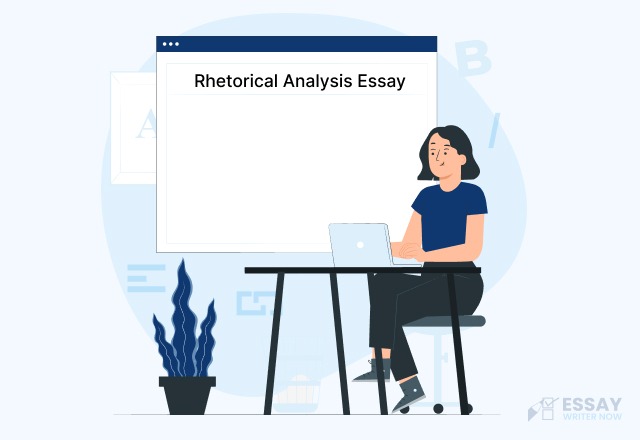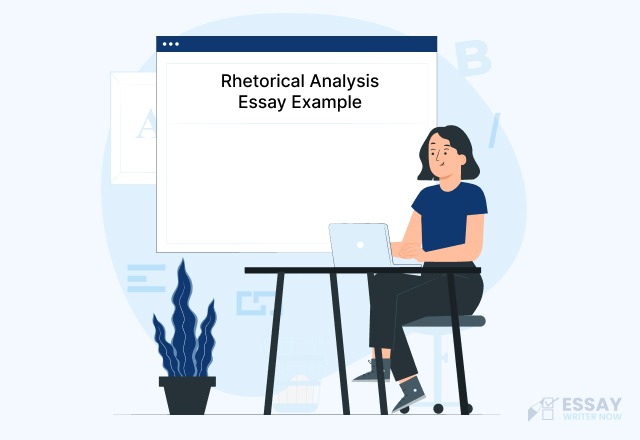Key Concepts in Rhetoric
A rhetorical analysis essay is a type of essay that dissects a piece of writing, speech, or other forms of communication to examine how the author or speaker uses language to persuade, inform, or entertain their audience.
This involves identifying and analyzing the rhetorical strategies, devices, and appeals employed in the text, such as ethos, pathos, and logos:
Ethos (Ethical Appeal)
This strategy establishes the author's credibility and trustworthiness. The author can build ethos by demonstrating expertise on the topic, highlighting their qualifications, or showcasing their good character. For instance, an academic paper might cite relevant research to show the author's knowledge, while a political speech might emphasize the speaker's past experience in government.
Pathos (Emotional Appeal)
This strategy evokes emotions in the audience to influence their response. Authors can use vivid language, imagery, and storytelling to connect with the audience on a personal level. They might appeal to emotions like fear, anger, pity, or patriotism to move the audience towards their point of view.
Logos (Logical Appeal)
This strategy relies on logic and reason to convince the audience. Authors can use evidence, data, statistics, and factual information to support their claims. They might also employ deductive or inductive reasoning to present a clear and persuasive argument.
The goal of a rhetorical analysis is not to summarize the content or agree/disagree with the author's viewpoint, but to evaluate the effectiveness of their communication techniques.
Understanding Text and Context
In rhetorical analysis, the term "text" refers to any piece of communication being analyzed. This could be a written document, a speech, an advertisement, or even a satirical image. The context includes everything surrounding the text, such as the author's background, the intended audience, the time and place of the text's production, and its purpose.
Understanding the context is crucial for a thorough rhetorical analysis. For instance, Martin Luther King Jr.'s "I Have a Dream" speech is powerful on its own, but its significance is heightened when we consider the historical context of the civil rights movement.
Analyzing Claims, Supports, and Warrants
A rhetorical analysis essay examines how an author builds their argument using claims, supports, and warrants.
- Claims: A claim is the main idea or assertion that the author wants the audience to accept. It could be a single statement or a series of interconnected ideas. For example, an essay might claim that climate change is the most pressing issue of our time.
- Supports: Supports are the evidence or reasoning used to back up the claims. This can include facts, statistics, expert opinions, or emotional appeals. For instance, the climate change essay might use scientific data and expert testimonies as supports.
- Warrants: Warrants are the underlying assumptions or logic that connect the supports to the claims. Often, warrants are implied rather than explicitly stated. In the climate change essay, the warrant might be the assumption that scientific consensus is a reliable indicator of truth.
Understanding these components helps you break down the argument and evaluate its effectiveness.
How to Start a Rhetorical Analysis Essay?
In order to start writing your essay, use the SOAPSTone strategy. This is a plan where you identify the speaker, the occasion, the audience, the purpose, and the tone of the writing. You should do this for every piece of writing that you analyze.
Here's how you can apply it:
Speaker
Who is the voice behind the text?
Is it a renowned expert, a passionate advocate, a concerned citizen, or a fictional character? Consider their background, credentials, and potential biases.
What kind of persona does the speaker create?
Are they authoritative, compassionate, humorous, or critical? The speaker's persona can significantly impact how the audience receives their message.
Occasion
What prompted the text?
Is it a response to a current event, a social issue, a personal experience, or a historical moment?
What is the broader context?
Consider the social, cultural, and historical factors that might have influenced the author's perspective and message.
Audience
Who is the intended readership or listener?
Is it a general audience, a specific group with shared interests, or a particular individual?
What are their values, beliefs, and expectations?
Understanding the audience helps explain why the author chose specific rhetorical strategies and language.
Purpose
Why did the author write this text?
What do they hope to achieve? Are they trying to persuade, inform, entertain, inspire, or provoke?
What is the main message or thesis?
Identifying the author's core argument is crucial for analyzing the effectiveness of their rhetoric.
Subject
What is the text primarily about?
What are the key topics, ideas, or themes that the author explores?
How does the author narrow down the focus?
Do they focus on a specific aspect of the subject or offer a broader perspective?
Tone
What is the author's attitude towards the subject and audience?
Is it formal, informal, serious, playful, optimistic, or pessimistic?
How does the tone contribute to the overall effect of the text?
The tone can significantly impact how persuasive or engaging the message is.
Writing the Rhetorical Analysis Essay
Writing a rhetorical analysis essay involves breaking down a text to understand how the author uses various strategies to convey their message. Here's a detailed guide on how to structure each part of your essay effectively.
Introduction
The introduction of your rhetorical analysis essay sets the stage for your analysis. It should provide a brief overview of the text you're analyzing, relevant background information, and your thesis. The thesis statement should clearly state your main argument about the text's rhetorical strategies.
- Overview of the Text:
- Start with a brief description of the text you are analyzing. Mention the title, author, and context.
- Provide a short summary of the text's content and its main message or purpose.
- Relevant Background Information:
- Offer context that will help your readers understand the significance of the text. This might include historical, cultural, or social background.
- Explain any relevant information about the author, such as their background, credibility, or motivations.
- Thesis Statement:
- Clearly state your main argument about the text's rhetorical strategies.
- The thesis statement should encapsulate the key elements you will analyze and how they contribute to the overall effectiveness of the text.
Example Introduction:
"Martin Luther King Jr.'s 'I Have a Dream' speech, delivered in 1963 during the March on Washington, is one of the most iconic speeches in American history. This rhetorical analysis examines how King's use of prophetic language, combined with his strategic appeals to ethos and pathos, creates a powerful and enduring message of hope and justice." |
Body Paragraphs
The body of your rhetorical analysis essay is where you delve into the details of the text. Each paragraph should focus on a different element of the text and contribute to your overall argument.
- Topic Sentence:
- Start each paragraph with a clear topic sentence that indicates the focus of the paragraph.
- The topic sentence should relate back to your thesis statement.
- Textual Evidence:
- Provide specific examples from the text to support your analysis. This could be direct quotes, descriptions, or references to specific sections.
- Make sure your evidence is relevant to the point you are making in the paragraph.
- Analysis:
- Explain how the textual evidence supports your argument. Discuss the rhetorical strategies used in the text.
- Consider how the author’s choices affect the audience and contribute to the text’s purpose.
- Connection to Thesis:
- Relate the analysis in each paragraph back to your thesis statement.
- Show how each point you make builds towards your overall argument.
Example Body Paragraph:
"King's speech is infused with prophetic language throughout. Even before the famous 'dream' section, he refers to the Lincoln Memorial as a 'hallowed spot' and speaks of rising 'from the dark and desolate valley of segregation' to 'make justice a reality for all of God's children.' By adopting a prophetic voice, King not only aligns himself with historical figures like Lincoln but also evokes the moral authority of biblical prophets. This ethical appeal strengthens his argument, making it not just a political plea but a moral imperative." |
Repeat this structure for each element you analyze, such as the use of ethos, pathos, and logos, or other rhetorical devices.
Conclusion
The conclusion of your rhetorical analysis essay should wrap up your analysis and reinforce your main argument.
- Restate Your Thesis:
- Summarize your main argument in a new way to reinforce it without simply repeating your thesis statement verbatim.
- Summarize Key Points:
- Briefly summarize the main points you made in your body paragraphs.
- Highlight how these points collectively support your thesis.
- Broader Implications:
- Discuss the broader significance of the text and your analysis. What does it reveal about the power of rhetoric?
- Connect your analysis to larger themes or implications, such as its impact on society, culture, or history.
Example Conclusion:
"In conclusion, Martin Luther King Jr.'s 'I Have a Dream' speech uses a combination of prophetic language, ethical appeals, and emotional imagery to convey a powerful message of justice and equality. By examining these rhetorical strategies, we gain a deeper understanding of why this speech remains a cornerstone of American oratory and a symbol of the civil rights movement. King's masterful use of rhetoric not only galvanized a generation but continues to inspire and challenge us to pursue justice and equality." |
Practical Tips for Writing an Effective Rhetorical Analysis Essay
Here are some practical tips to help you write your rhetorical analysis essay:
Choose a Compelling Text
Select a text that is rich in rhetorical strategies and has a clear purpose and audience. This will provide you with plenty of material to analyze and discuss.
Understand the Context
Research the historical, cultural, and social context of the text. Understanding the context will help you better analyze the author’s rhetorical strategies and their effectiveness.
Ask the Right Questions
Before you start writing, ask yourself questions about the text’s purpose, audience, and rhetorical strategies. What is the author trying to achieve? Who is the intended audience? How does the author use logos, ethos, and pathos?
Be Specific and Detailed
Provide specific examples from the text to support your analysis. Detailed evidence and thorough explanations will make your analysis more convincing and insightful.
Organize Your Essay Clearly
Structure your essay with clear and logical organization. Use topic sentences to introduce each paragraph and ensure that each point you make supports your thesis.
Avoid Summary
Focus on analysis rather than summary. While it’s important to provide context, your main goal is to analyze how the text’s rhetorical strategies work.
Revise and Proofread
After writing your essay, take the time to revise and proofread it. Check for clarity, coherence, and grammatical accuracy. A polished essay will be more effective and persuasive.
To sum it up!
Rhetorical analysis is a powerful tool for understanding how texts persuade and influence audiences. By examining the rhetorical strategies of logos, ethos, and pathos, and considering the context and structure of the text, you can uncover the techniques that make a piece of communication effective. Armed with these insights, you’re now ready to write your own rhetorical analysis essay.
Start by choosing a compelling text, ask the right questions, and dive deep into the art of persuasion.



